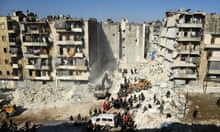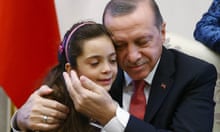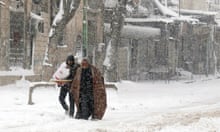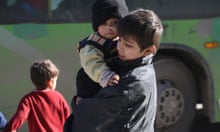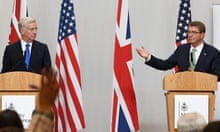More than 2,000 people have been evacuated from besieged districts of east Aleppo under a deal brokered by Turkey and Russia and overseen by the Red Cross, and thousands more are expected to make the journey in the coming hours and days.
Thursday’s evacuations, carried out using ambulances and green buses, will end months of deprivation and suffering for some of the desperate residents of east Aleppo. They have been living under siege in a shrinking patch of land controlled by the opposition, surviving bombardment by forces loyal to the regime of Bashar al-Assad, Iranian-backed militias and the Russian air force.
More than 1,000 people are thought to have been killed in the Syrian government’s latest campaign in Aleppo, and tens of thousands more have been displaced.
Many of those in the besieged areas have been living without functioning hospitals or much running water or electricity. They faced a choice of making a last stand or surrendering to the regime’s allied militias, who the UN said had killed civilians in newly reclaimed areas.
The departures marked the beginning of the closing chapter of the rebellion in Aleppo. Half of the city was seized by the opposition in 2012 and since then it has been divided, the last major urban area in Syria where the rebels maintained an active presence.
A convoy of 13 ambulances and 20 buses transported nearly 1,000 people to a rebel-held town west of the city, and then returned to pick up a second group numbering 1,198.
The International Committee of the Red Cross (ICRC), which is overseeing the evacuation deal along with the Syrian Arab Red Crescent, said the evacuations would continue through the night.
The UN humanitarian adviser for Syria, Jan Egeland, said the operation was three-pronged, involving the evacuation of the sick and wounded, vulnerable civilians, and fighters. “Thousands of people are in need of evacuation, but the first and most urgent thing is wounded, sick and children, including orphans,” he said.
He estimated the number of civilians to be evacuated at 30,000. He criticised the failure of the international community to come to the aid of Aleppo’s people, tweeting:
For 3000 years #Aleppo gave so much to world civilisations. How come, when Aleppo's people needed us the most, we gave so little back?
— Jan Egeland (@NRC_Egeland) December 15, 2016
A teacher in east Aleppo, who was waiting to be evacuated, said there were mixed feelings among residents, with some angry they were being forced to leave and others happy that the violence would stop.
He said some locals were burning their belongings in their homes so they would not be looted by pro-regime forces.
“Most of them are happy they are going out. Some of them are angry they’re leaving their city. I saw some of them crying, and that’s almost my feeling in a way,” he said. “It’s difficult to leave your belongings and know your enemy will take them.”
The new deal to evacuate the people of east Aleppo came after the collapse of an agreement the previous day over Iranian objections. Tens of thousands of civilians who remained trapped in opposition-held areas of the city without food, water or medicine came under a renewed hail of artillery and airstrikes after the deal collapsed.
The latest agreement allows for the evacuation of civilians and wounded, as well as rebel fighters bearing small arms, from besieged areas of the city, with Turkey and Russia acting as guarantors. The deal began with a ceasefire at midnight local time in Aleppo.
As a concession to Tehran, which is backing the militias spearheading the offensive into Aleppo, wounded civilians will be evacuated from Fua and Kefraya, two Shia villages in the province of Idlib that have been surrounded by rebels for years.
Syrian state media said on Thursday that 29 trucks and ambulances were heading to the villages.
Sources in east Aleppo said shelling in the city had stopped at midnight local time, but gunfire was reported on Thursday morning before the ICRC said the evacuation had begun.
The White Helmets civil defence force, which is based in east Aleppo, said one of its members had been injured by a sniper while clearing an evacuation route and its ambulances in the enclave had come under small-arms fire.
The effort to treat and house tens of thousands of civilians, many of whom have had no access to medicine or much food for the past several weeks, is likely to be immense. The Turkish government has said it is prepared to receive the wounded and is readying refugee camps to house as many as 80,000 people in northern Syria and inside Turkey.
The aid organisation Mercy Corps said its workers were ready to provide food, blankets, money and other supplies to the civilians arriving in the western countryside of Aleppo, which is under opposition control.
Assad hailed the fall of Aleppo as a historic turning point. In a video released by his office, the Syrian president said: “What is happening today is the writing of history.”
In a philosophical and whimsical message, he talked about the fall of Aleppo in the context of the birth of Christ and the fall of the USSR. The reclaiming of Aleppo would be of similar historical significance and a key turning point in the conflict, he said.
The UK foreign secretary, Boris Johnson, summoned the Iranian and Russian ambassadors to convoy his “profound concern” over the humanitarian crisis, telling them that they had failed to uphold their obligations under international law, specifically by failing to facilitate the delivery of humanitarian aid to civilians during the siege.
“They deserve no credit for the fact that an evacuation appears to be under way today,” Johnson said, adding that it was vital that the UN now oversaw the evacuation process and that all civilians and non-combatants were not punished. Johnson said he was deeply disturbed by reports that some of those being evacuated had been taken away by government forces.
Graffiti left by residents in the city for the militias and pro-Assad forces who were expected to enter after their departure highlighted the mixed feelings of those who had to abandon their homes.
One message said: “We will return, Aleppo. Our destroyed buildings are a witness of our resistance and your criminality.”
Another condemned the destruction meted out by the Assad regime and its allies on east Aleppo: “Under every destroyed building are families buried with their dreams by Assad and his allies.”
- Additional reporting by Patrick Wintour

